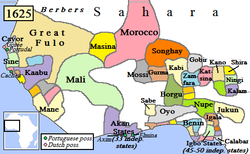- Dendi Kingdom
-
Dendi Kingdom ← 
1591–1901  →
→Capital Lulama Language(s) Songhai Religion Islam Government Monarchy King - 1591-1598 Askia Nuh I - 1887-1901 Askia Malla History - Established 1591 - Conquered by the French 1901 The Dendi Kingdom (1591–1901) was a pre-colonial West African state in modern-day Niger founded by the Songhai people after the collapse of their empire Songhai.
Contents
The Rise & Fall of Gao
Since the middle of the 8th century AD, the Songhai people had dwelled in eastern Mali at the trading city of Gao. The region surrounding the kingdom came under the influence of Sundiata's Mali Empire after 1275. However, it was not completely brought under the empire's control until its 1324 conquest by General Sagha Mandjan.
In 1464, Gao regained its independence thanks to the bumbling of the Mali Empire and began seizing lands for itself. The new Songhai Empire began a campaign of conquest and eventual conversion under the Askiya dynasty. They finally vanquished their old overlords in 1546 capturing and destroying the Mali capital of Niani. But the Songhai's quick emergence in West Africa would be followed by a quick decline. A disastrous defeat at the Battle of Tondibi against invading Saadi forces armed with guns resulted in the end of the empire. The Askiya dynasty fled the city of Gao as the Saadi approached and resettled in their native Dendi region of Niger.
Dendi
The Askiya dynasty reorganized itself under a new king called Nuhu. This second (or third depending on when one starts counting) Songhai Empire established its new capital at Lulami. It soon began fighting to establish itself in the region and restore Songhai prestige.
Continued Presence in Mali
Little record exists between 1591 and the early 18th century reign of Hanga for the Dendi Kingdom. What is apparent is that the kingdom maintained a preoccupation with regaining or at least undermining Saadi rule in eastern Mali. If the Songhai Empire was truly over, no one had told the Askiyas. In 1609, the Malian city of Jenne revolted against the Saadi pashas (governors) with Dendi support. The Saadi were eventually able to regain the city, but with a lack of support from the homeland they soon abandoned the area leaving it to Taureg and Fulbe nomads.
Further Saadi Conflict
In 1612, Askiya al-Amin came to power in Dendi. His short reign of six years was followed by the long and tyrannical rule of Askiya Dawud. Dawud killed many people during his reign including relatives and members of the military. His brother, Isma'il, fled to Timbuktu and sought Saadi support to overthrow al-Amin. Isma'il returned in to Dendi and deposed his brother in 1639. Upon attempting to send the foreign army back, he was deposed and replaced by an askiya the pasha's felt would be easier to deal with. This ruler was removed by the Songhai people, and Dendi returned to fighting in Niger and Mali.
Final Downfall
Dendi staggered on for the next two and a half centuries witnessing increasingly unstable reigns, coups and counter-coups. When France entered the region, Dendi was in no shape for battle. In 1901, the French deposed the last askiya of the Dendi ending Songhai's control of either Mali or Niger until independence.
External Links
- Map of Dendi (Dandawa) language from the LL-Map Project
- Information about Dendi language from the MultiTree Project
See also
- Askiya Dynasty
- Songhai Empire
- List of Sunni Muslim dynasties
Sources
Categories:- Former monarchies of Africa
- Former countries in Africa
- States and territories established in 1591
- States and territories disestablished in 1901
- Songhai Empire
- States of pre-colonial Africa
- History of Niger
Wikimedia Foundation. 2010.

